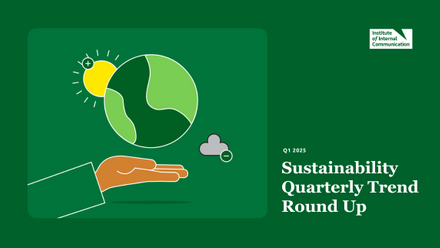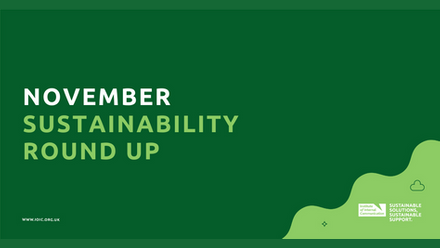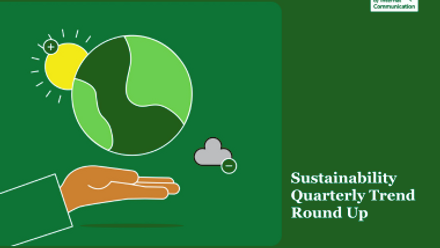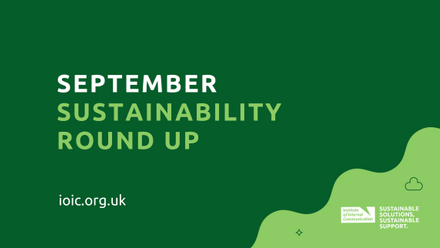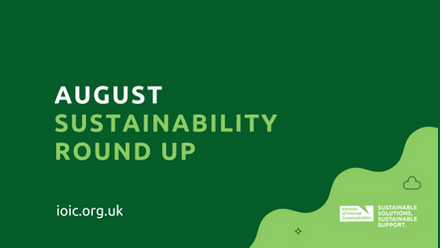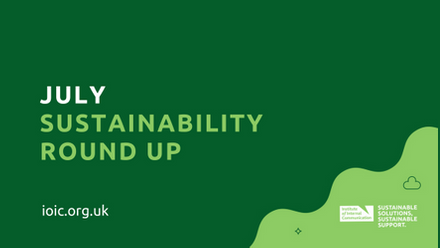Personal sustainability
A new US-based study has examined how individual and organisational factors influence employees' environmentally friendly behaviours in the workplace.
Although the survey of 374 employees focused on the tourism and hospitality industries specifically, there are learnings for us across all sectors. The research found that individual-oriented elements (personal values, beliefs and norms) and organisational factors (support for the environment and psychological ownership) positively impacted employees' eco-friendly practices at work.
The study emphasised the importance of employees adopting sustainable habits at home, as this then influenced and fed into their environmentally conscious behaviour in the workplace. Interestingly, previous studies had shown that people may not always be equally motivated to act in environmentally friendly ways across different settings (e.g. at work, where they might not perceive the same level of importance).
Additionally, psychological ownership played a crucial role in mediating the relationship between organisational support and eco-friendly practices at work. The findings suggest that organisations can foster pro-environmental behaviour by encouraging a supportive workplace culture, promoting psychological ownership, as well as leveraging employees' personal values and norms related to sustainability.
The take-away for us is that with well-pitched communication, we can help engender a culture at work that’s equally supportive of colleagues’ environmental initiatives (wherever they are) and that helps nurture ownership of their endeavours. Get this right and it’ll be an essential part of the mix when it comes to achieving wider organisational goals on sustainability.
Organisational sustainability
EdenLab is a green growth and sustainability innovation consultancy whose raison d’être is to make global brands and businesses more sustainable.
It tells its clients that are serious about going green that they need to stop treating sustainability as merely a measurement exercise, since that approach often fails to drive meaningful change. While there might be use in establishing baselines and tracking metrics, over-emphasis on measurement can all too easily morph into a form of procrastination, delaying substantive action.
Why might this be? The consultancy believes an overreliance on measurement assumes the past is a reliable guide for the future. Given the unpredictable nature of the climate emergency, complex systems can spiral out of control in ways that current models may not account for – and which might overlook the issues that lie ahead.
So, an over-reliance on extensive measurement and reporting means many companies are failing to meet their emissions reduction targets.
If some of our organisations find a more metric-led approach helpful at this stage of their sustainability journeys, it’s incumbent on us as communicators to encourage our colleagues to ensure they’re measuring the right things at least. Discover what these are here.
Community sustainability
If we’re going to help our organisations in their sustainability endeavours, it’s vital to ensure everyone can participate and that we bring them along with us.
So, it’s refreshing to read about a non-profit investor breaking down barriers by actively seeking out diversity in the founders it backs, and funding their innovative ways to fight climate change,
US-based Elemental Excelerator was founded by Dawn Lippert in 2009 to focus on scaling transformative, innovative, and equity-centred climate solutions with deep community impact.
Over half of the businesses that Elemental selects have been set up by those traditionally excluded by race or gender from many funding opportunities. Elemental believes this is a loss not only for the overlooked founders, but for society as a whole, since diverse teams tend to be more impactful and having plurality of perspective around a table is more conducive to achieving game-changing progress.
What’s striking about Elemental’s approach is the requirement for its entrepreneurs to talk to communities before any investment is made, to make sure this is something the communities actually want.
And that upfront engagement clearly pays off – 93 percent of their start-ups say partnering with community organisations has helped them sense-check their value proposition and has ultimately contributed to the success of their projects.
Economic sustainability
The transition to net zero presents unprecedented opportunities for the UK to become a more resilient and productive economy while also tackling climate change.
Encouragingly, a recent report has revealed that the UK's net zero economy grew by 9% in 2023, in stark contrast to the anaemic 0.1% growth experienced in the overall economy.
The net zero sector produced £74 billion in goods and services and 765,000 jobs in 2023. Net zero hotspots with well-paid jobs are also spread across the country, including deprived areas and marginal constituencies.
Despite the opportunities, however, the UK has weakened some net zero policies and fallen behind in renewable energy investment attractiveness. Experts are urging political parties to provide leadership, stability and investment to drive further growth in the net zero transition. Otherwise, the robust future growth of green businesses will be threatened by government policy reversals, lack of investment, in addition to competition from the EU and US.
It's never edifying to witness net zero being politicised, so perhaps we need to keep an ear out for this unhelpful and distracting background noise. That way, we can neutralise it as we make the objective, rational case for embracing the change we need to help grow our organisations.
Environmental sustainability
The state of the climate in 2023 gave portentous new meaning to the phrase ‘off the charts’. It was the warmest year in the 174-year observational record of the World Meteorological Organization (WMO).
The world has also just experienced the warmest February on record globally, making it the ninth month in a row with record temperatures for the time of year, scientists have said.
Global sea surface temperatures are also at their highest ever recorded, data from the EU’s Copernicus Climate Change Service shows.
The global average temperature for the past 12 months – between March 2023 and February 2024 – was the highest on record, at 1.56C above pre-industrial levels. That puts the world temporarily above the 1.5C threshold beyond which, over the long term, the worst impacts of climate change are expected.
In addition, Europe’s winter – from December to February – was the second warmest on record for the continent. Beyond Europe, temperatures were above average over northern Siberia, central and northwest North America, the majority of South America, across Africa, and in western Australia.
Yes, these stats all make for pretty sobering reading. But it’s important to keep abreast of them to help maintain focus in our endeavours to make our organisations more sustainable – and to remind ourselves and our colleagues why we all need to play our part in bringing about meaningful change.

